Education plays a crucial role in fostering independent thinking, which is essential for personal growth. It enhances critical skills like creativity, problem-solving, and effective communication. This article explores how effective education systems promote independent thought, the unique approaches that encourage critical analysis, and the challenges faced in cultivating these skills. Additionally, it discusses strategies for creating supportive learning environments that nurture independent thinkers.

How does education influence independent thinking?
Education significantly enhances independent thinking by cultivating critical skills essential for personal growth. It encourages learners to analyse information, question assumptions, and develop their own perspectives. Research indicates that students exposed to inquiry-based learning demonstrate greater creativity and problem-solving abilities. Such educational approaches foster a mindset that values exploration and self-reflection, ultimately leading to more autonomous decision-making. Additionally, education provides the tools necessary for effective communication, allowing individuals to articulate their thoughts clearly and confidently. This empowerment through education not only shapes independent thinkers but also contributes to a more informed and engaged society.
What are the key psychological theories linking education and independent thinking?
Education fosters independent thinking through various psychological theories that emphasise critical skills. Key theories include Piaget’s cognitive development, which highlights stages of learning and reasoning, and Vygotsky’s social development theory, which stresses the role of social interaction in cognitive growth. Constructivism, as proposed by Bruner, encourages active learning and personal interpretation of knowledge. These theories collectively underscore the importance of fostering an environment that promotes inquiry, reflection, and problem-solving abilities, essential for personal growth.
What role does critical thinking play in personal growth?
Critical thinking is essential for personal growth as it enhances decision-making and problem-solving abilities. It encourages self-reflection and fosters independence in thought processes. Engaging in critical thinking cultivates a deeper understanding of oneself and the world, leading to informed choices and personal development. This skill supports lifelong learning and adaptability, crucial for navigating life’s challenges. By honing critical thinking, individuals can better assess situations, evaluate options, and achieve their personal goals.
What are the stages of developing critical thinking skills?
The stages of developing critical thinking skills include awareness, analysis, evaluation, and application. Each stage builds upon the previous one, fostering independent thinking essential for personal growth.
1. Awareness: Recognising the need for critical thinking in decision-making.
2. Analysis: Breaking down information into components to understand relationships.
3. Evaluation: Assessing arguments and evidence to determine validity and reliability.
4. Application: Implementing critical thinking skills in real-life situations to solve problems.
How can educators foster these skills in students?
Educators can foster independent thinking by encouraging inquiry-based learning and critical discussions. Implementing project-based learning allows students to engage with real-world problems, enhancing their analytical skills. Providing constructive feedback promotes self-reflection, which is vital for personal growth. Additionally, incorporating diverse viewpoints in discussions helps students develop a well-rounded perspective, crucial for independent thought.
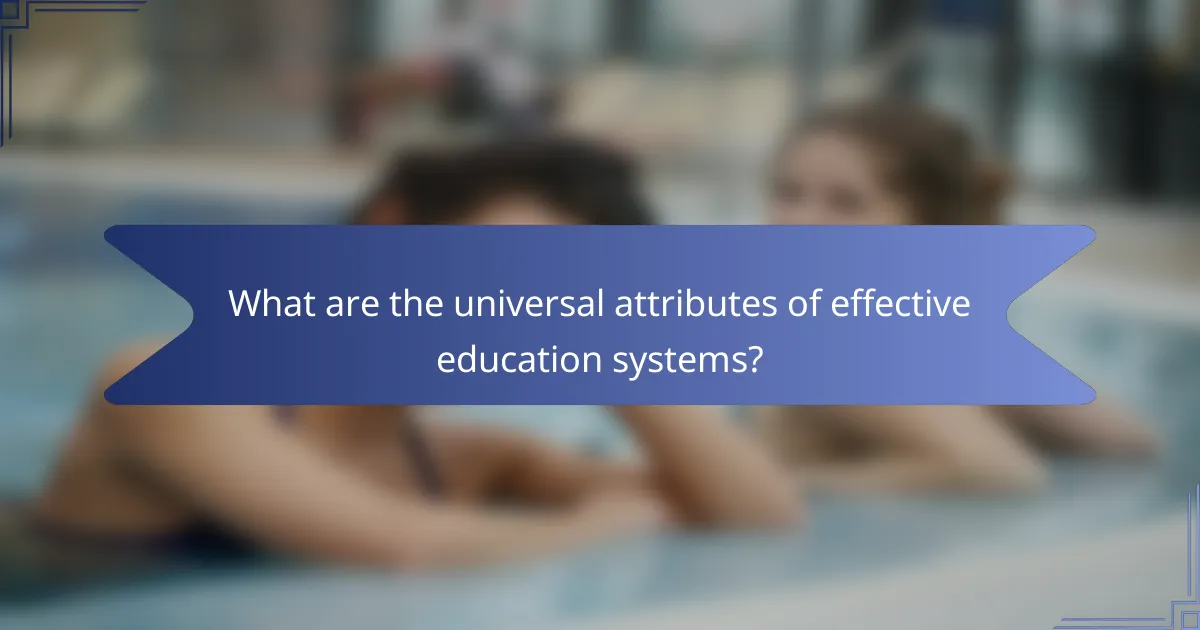
What are the universal attributes of effective education systems?
Effective education systems promote independent thinking by encouraging critical skills essential for personal growth. Key attributes include fostering creativity, enhancing problem-solving abilities, supporting collaboration, and nurturing self-directed learning. These elements collectively empower students to think critically and make informed decisions. Research indicates that systems prioritising these attributes yield better educational outcomes and prepare learners for future challenges. By integrating these components, education systems can cultivate a generation of independent thinkers who contribute positively to society.
How do diverse teaching methods enhance independent thought?
Diverse teaching methods significantly enhance independent thought by encouraging critical thinking and creativity. These methods, such as collaborative learning, project-based activities, and inquiry-based approaches, foster an environment where students actively engage with material.
For example, collaborative learning allows students to share perspectives, leading to deeper understanding and analysis. Project-based activities promote problem-solving skills, as students navigate real-world challenges. Inquiry-based approaches stimulate curiosity, encouraging students to ask questions and seek answers independently.
Research indicates that students exposed to varied teaching methods demonstrate higher levels of critical thinking skills. This adaptability not only supports academic success but also prepares learners for personal growth in diverse contexts.
What impact do collaborative learning environments have on critical skills?
Collaborative learning environments enhance critical skills by promoting independent thinking and personal growth. These settings encourage students to engage in discussions, share diverse perspectives, and solve problems collectively. As a result, learners develop essential skills such as critical analysis, creativity, and effective communication. Studies show that students in collaborative settings demonstrate improved problem-solving abilities and greater confidence in their ideas. This approach fosters a deeper understanding of content and prepares individuals for real-world challenges.
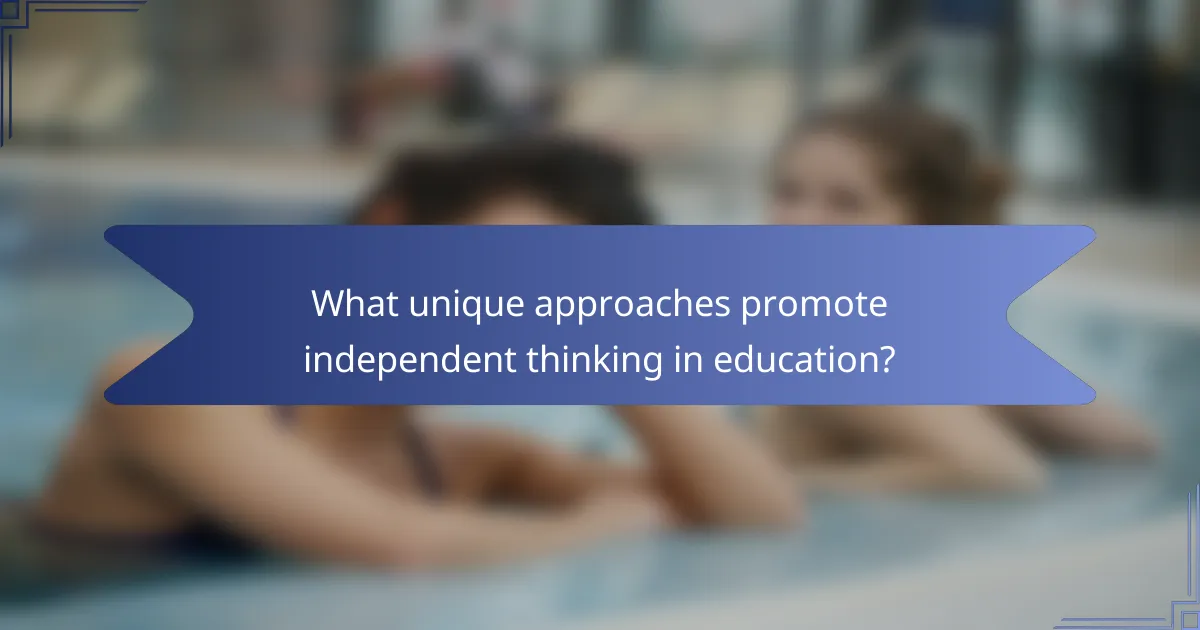
What unique approaches promote independent thinking in education?
Encouraging independent thinking in education involves fostering creativity, critical analysis, and problem-solving skills. Unique approaches include project-based learning, which promotes real-world problem-solving, and Socratic questioning, encouraging deeper inquiry. Additionally, integrating interdisciplinary studies allows students to draw connections across subjects, enhancing their analytical skills. Mindfulness practices can also support self-reflection, leading to greater autonomy in thought processes.
How can project-based learning cultivate critical thinking?
Project-based learning enhances critical thinking by engaging students in real-world problem-solving. This approach fosters independent thought through collaboration, creativity, and application of knowledge. Students analyse situations, develop solutions, and reflect on outcomes, cultivating essential critical skills. Research indicates that project-based learning significantly improves analytical abilities and decision-making skills, leading to personal growth and lifelong learning.
What is the significance of inquiry-based learning in fostering independence?
Inquiry-based learning significantly enhances independence by encouraging students to explore, question, and engage with content actively. This method fosters critical thinking skills, allowing learners to take ownership of their education. As a result, students develop the ability to analyse information, synthesise ideas, and draw conclusions autonomously. Research indicates that inquiry-based approaches lead to improved problem-solving skills and greater self-efficacy among learners. Ultimately, this educational framework cultivates a mindset geared towards lifelong learning and personal growth.
What techniques can be employed in inquiry-based learning?
Inquiry-based learning employs techniques such as questioning, exploration, and reflection to enhance independent thinking. These methods encourage students to investigate topics deeply, fostering critical skills necessary for personal growth. Techniques include collaborative group work, where students engage in discussions, and project-based learning, which allows for hands-on experiences. Additionally, integrating technology can facilitate research and enhance the learning process. Overall, these techniques promote an active learning environment that nurtures curiosity and critical thinking.
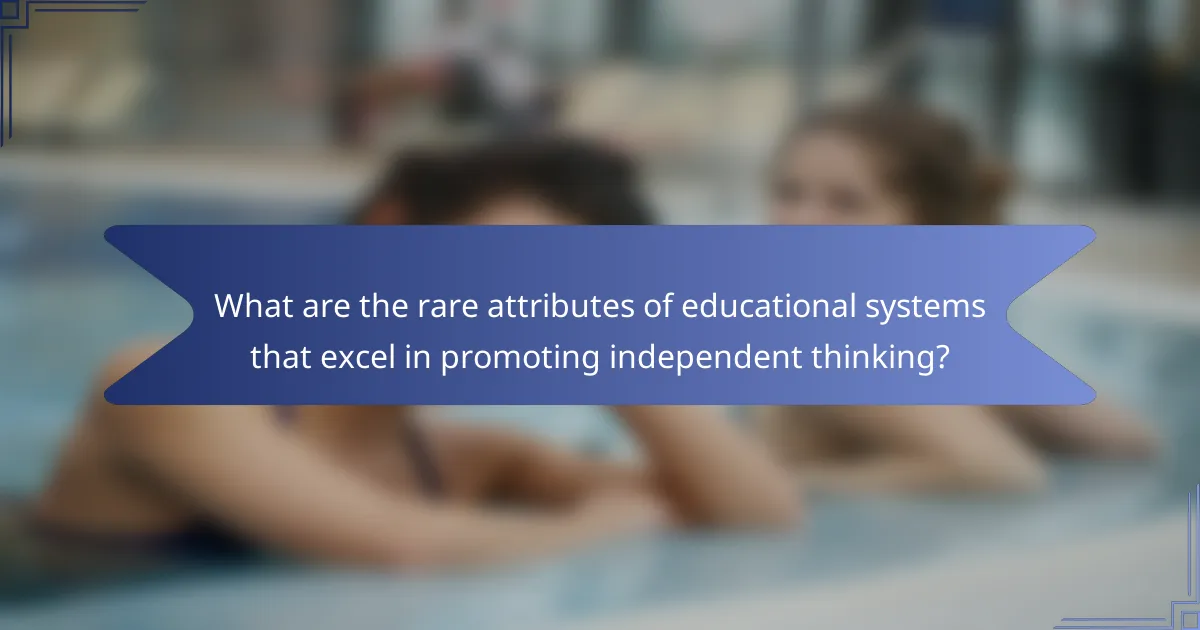
What are the rare attributes of educational systems that excel in promoting independent thinking?
Educational systems that excel in promoting independent thinking often exhibit rare attributes such as personalised learning environments, interdisciplinary approaches, and emphasis on real-world problem-solving. These attributes foster creativity and critical analysis, essential for personal growth. Personalised learning allows students to explore subjects at their own pace, enhancing engagement and retention. Interdisciplinary approaches break down traditional subject barriers, encouraging holistic understanding. Lastly, a focus on real-world problem-solving equips students with practical skills, preparing them for future challenges.
How does the integration of technology influence independent thinking skills?
The integration of technology enhances independent thinking skills by providing diverse resources and interactive learning experiences. Technology encourages self-directed learning, enabling students to explore topics at their own pace. Access to varied information fosters critical analysis, as learners evaluate sources and synthesise knowledge. Collaborative tools promote discussion and debate, further refining independent thought. As a result, technology acts as a catalyst for developing essential critical thinking skills.
What role does emotional intelligence play in education?
Emotional intelligence significantly enhances education by fostering independent thinking and critical skills. It enables students to understand their emotions and those of others, promoting effective communication and collaboration. This skill set directly supports personal growth, as emotionally intelligent individuals can navigate challenges and make informed decisions. Research indicates that students with high emotional intelligence tend to perform better academically, demonstrating improved problem-solving abilities and resilience. By integrating emotional intelligence into educational practices, educators can cultivate an environment that encourages critical thinking and lifelong learning.
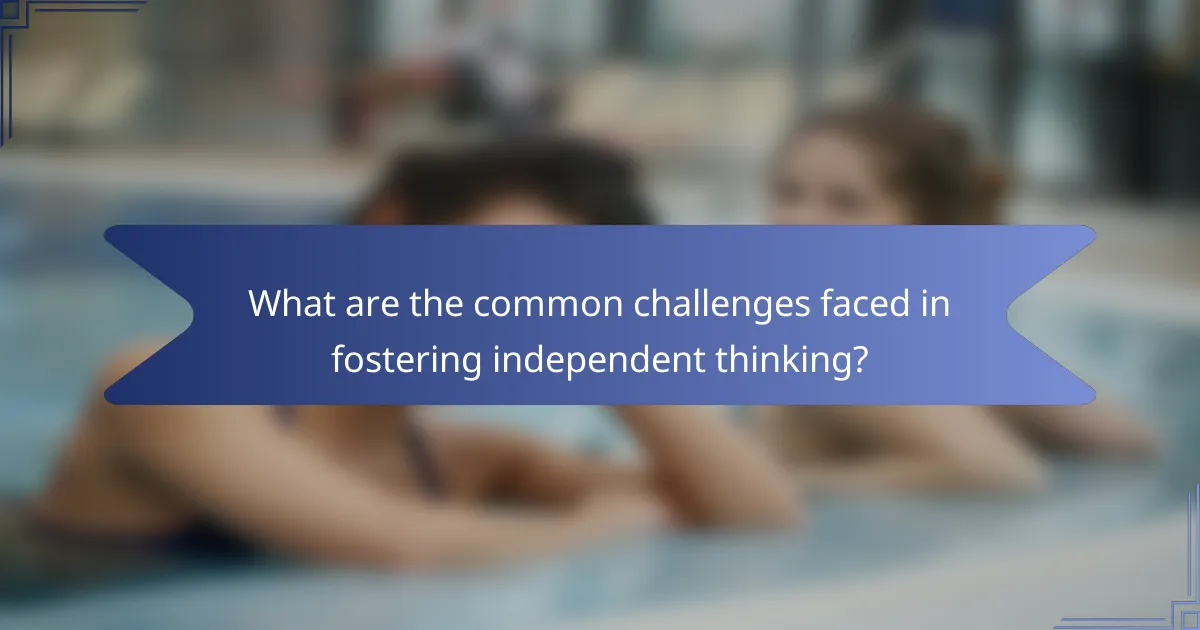
What are the common challenges faced in fostering independent thinking?
Fostering independent thinking faces challenges such as rigid educational structures, lack of encouragement for questioning, and insufficient critical thinking training. These obstacles hinder students’ ability to develop essential analytical skills. Traditional teaching methods often prioritise rote memorisation over exploration, limiting creativity. Additionally, fear of failure can discourage risk-taking, further stifling independent thought. Addressing these challenges is crucial for cultivating a generation capable of critical analysis and personal growth.
How can educators overcome resistance to critical thinking in traditional settings?
Educators can overcome resistance to critical thinking by implementing interactive teaching methods. Engaging students through discussions and problem-solving activities fosters an environment conducive to independent thought.
Building a culture that values questioning and exploration encourages students to embrace critical thinking. Providing real-world applications of concepts enhances relevance, making critical skills more appealing.
Offering professional development for educators equips them with strategies to integrate critical thinking into their curricula, addressing challenges effectively.
Regularly assessing students’ critical thinking skills helps identify areas for improvement, ensuring continuous growth in independent thinking.
What are the limitations of conventional education systems in promoting independence?
Conventional education systems often limit independence by emphasising rote memorisation over critical thinking. This approach stifles creativity and discourages self-directed learning. Students may become reliant on teachers for direction, reducing their ability to make independent decisions. Additionally, standardised testing prioritises conformity, leaving little room for individual expression or exploration. These factors collectively hinder the development of essential skills necessary for personal growth and autonomy.
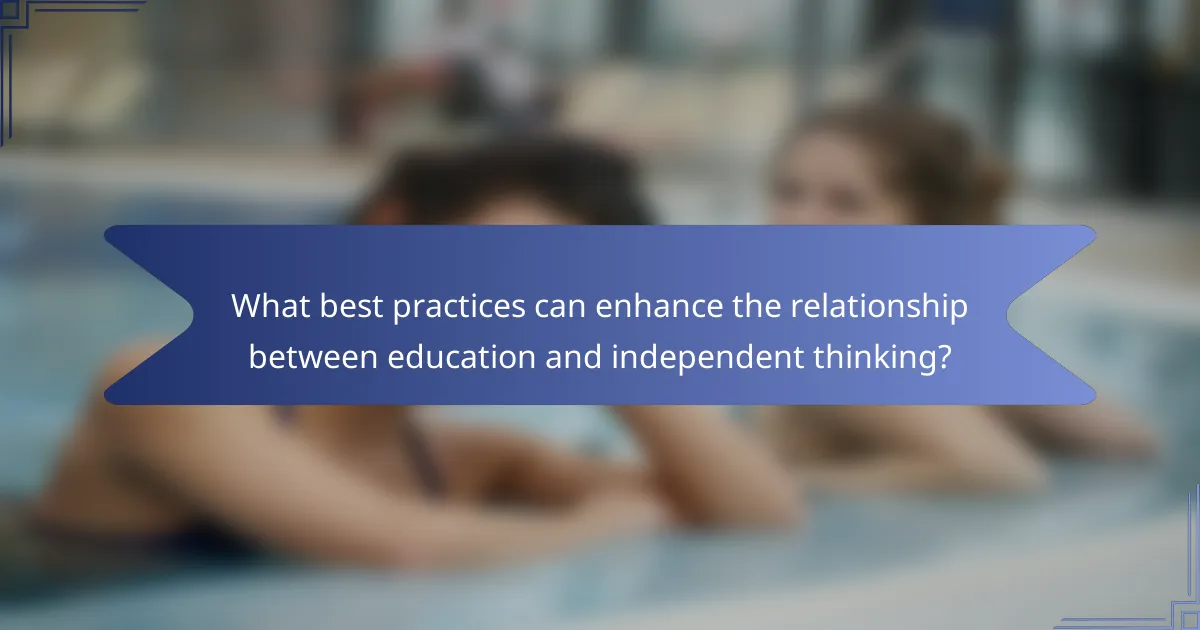
What best practices can enhance the relationship between education and independent thinking?
Encouraging independent thinking in education enhances critical skills essential for personal growth. Effective strategies include promoting inquiry-based learning, fostering a supportive environment, and integrating real-world problem-solving into curricula.
Inquiry-based learning encourages students to ask questions and seek answers, promoting curiosity and critical thinking. A supportive environment, where students feel safe to express ideas, enhances their confidence in independent thought. Real-world problem-solving connects academic concepts to practical applications, reinforcing the relevance of independent thinking.
Collaboration among students further nurtures independent thought by exposing them to diverse perspectives. Educators can facilitate this by incorporating group projects and discussions, allowing students to learn from each other while developing their unique viewpoints.
Finally, continuous feedback from educators helps refine students’ independent thinking skills, guiding them in evaluating their thought processes and conclusions. This iterative approach fosters a deeper understanding of subjects and enhances their ability to think critically.
How can learners apply critical thinking skills in real-life situations?
Learners can apply critical thinking skills in real-life situations by analysing information, evaluating options, and making informed decisions. These skills foster independent thinking and enhance personal growth. For example, when faced with a problem, learners can identify the root cause, consider various solutions, and weigh the potential outcomes. This process cultivates a mindset that values evidence-based reasoning and reflection. By practising these skills regularly, individuals can improve their ability to navigate complex situations effectively.
What are the most effective strategies for continuous personal growth through education?
Engaging in continuous personal growth through education requires effective strategies that foster independent thinking. These strategies include cultivating a growth mindset, embracing diverse learning methods, and applying knowledge through real-world experiences.
A growth mindset encourages individuals to view challenges as opportunities for development. This perspective enhances resilience and adaptability, essential traits for personal growth. Diverse learning methods, such as experiential learning and collaborative projects, promote critical thinking and problem-solving skills.
Real-world application of knowledge solidifies learning and encourages independent thought. Engaging in discussions, debates, and reflective practices further develops critical skills necessary for personal growth. These strategies collectively enhance the relationship between education and independent thinking.